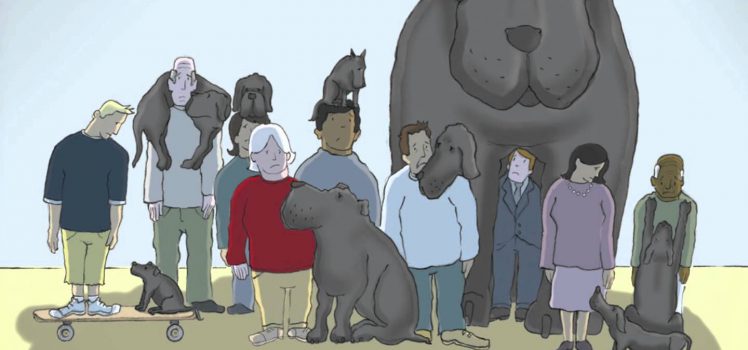How I Tamed The Black Dog of Depression

The 7th of April is the World Health Day which is dedicated to depression this year.
Our platform is providing information about clinical trials for many different conditions, but depression is one that accompanies many of them.
We at FindMeCure decided to raise awareness and talk about it lauder and openly. Together with you. No inconvenience. No shame. No reticence.
Send us your stories about depression. May they be raw and real. What do you want to say, what do you want to hear, what do you want to feel. Write it down. Words have power.
All the stories we receive at story@findmecure.com will be featured in a free E-Book to give a voice to depression stories and break the stigma.
In case you need some inspiration here is the black dog story of our talented blog author Nelly Katsarova. Read it and share in the comments how do you feel about it!
I read that over and over again, like some sort of a mantra: talking about it might be the first step to recovery. Talking about it. Any “it”.
Whenever I had any kind of a problem I was always advised to talk about it – by friends or random strangers on the internet, whose articles or videos I followed thinking they might have the answer. But then it sank in. I should talk about it because I have the answer and talking just helps figure it out on my own.
I realized that after I stopped going to therapy.
I can’t write about depression in statistics and well-meaning clichés like “you should seek help” and “it’s your depression talking, not you”, not because these aren’t true but because I know what it feels like to be on the receiving end. It just doesn’t sound comforting when you’re in the midst of a depressive episode.
Mine was a really small black dog, a sad little puppy who begged for attention – never demanded – so I was able to ignore it for quite some time. Until it got bigger. Louder. And I had no choice but to recognize its existence.
That was actually the hard part for me. I didn’t even say “depression” out loud – what if they stuff me with pills and deem me abnormal? Other people have it worse, sure, and I should just think positive thoughts, and maybe a walk in the park will lighten my mood. I mean, I know what they say.
And then I started going to therapy. And it was such a relief. Just being asked the right questions and hearing my own thoughts helped me immensely. My therapist didn’t think I’m “crazy” or “ungrateful”, she didn’t tell me to “just stop feeling this way” or “look on the bright side”. She gently pushed my personal investigation in the right direction so I could figure out the answer for myself.
It turns out, the answer is much more complex than I imagined. It’s not a three-step solution, it’s not the single cause of all, instead … it’s learning to manage. To recognize your triggers and coping mechanisms, your deep-seated negative beliefs about yourself or life. And it’s also about allowing yourself to talk about the things that bother you, to allow yourself to be bothered, to be angry or sad or apathetic.
It’s not a three-step solution, it’s not the single cause of all, instead … it’s learning to manage. To recognize your triggers and coping mechanisms, your deep-seated negative beliefs about yourself or life. And it’s also about allowing yourself to talk about the things that bother you, to allow yourself to be bothered, to be angry or sad or apathetic.
So, the first step really is allowing yourself to be depressed. Recognize the black dog, however small or big it might be, and… let it exist in the first place. Running away from something, thinking it shouldn’t be happening, trying to ignore it – that only makes it seem scarier and harder to deal with. Facing your depression is about being honest with yourself – the black dog is here and it’s not going to leave if you ignore it. And yes, some people have it worse, but that doesn’t take away your right to be depressed.
Allow yourself to take all the time you need, to not be “productive” today, don’t rush it, it’s a journey… and believe it or not, it can even be a very fulfilling and meaningful one.
I few years after I stopped seeing a therapist regularly I still have these moments when I hear the black dog barking. And no, there is no algorithm, no step-by-step get-better mental choreography. As I said, it’s about getting to know yourself, getting to know the different shades of your emotions and moods and the kind of care each of them needs. Some black dogs like to visit sometimes to be pet a little and then they leave… some stay for longer and are quite needy. So get to know your dog. And talk about it – it does help figure it out.
Share your story with us. If you or anyone you know get frequent visits from the black dog, tell us about it. We believe in storytelling and the power it holds to shape our realities.
You can send your depression story at story@findmecure.com. Share this articles to encourage more people to talk about depression openly.

